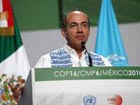| Videos | ? Latest |
|
? Feature | ? Sports | ? Your Videos |
New package approved at Cancun climate talks

Negotiators at the UN Climate Conference have said yes to a modest plan to combat global warming. The document was approved after initially being considered by an informal plenary session, and then passed to a pair of working groups covering the Kyoto Protocol and longer commitments. Participants say the package heralds "a new era of international cooperation," and "presents the result of a year of consultations."
Extended overnight talks in Cancun have finally resulted in at least a modest plan to tackle climate change.
More than 100 environment ministers from around the globe worked through the wee hours of Saturday morning to end a stalemate pitting developing countries against Japan and other countries, which don't want to extend the Kyoto Protocol. That accord curbs emissions from industrialized countries until 2012.
The new proposal bolsters the establishment of a Green Climate Fund to support developing nations in obtaining clean energy technology to reduce greenhouse gases, but doesn't identify specific financing sources.
It also refers, vaguely, to "a second commitment period" for the Kyoto Protocol, which means the agreement's future will be decided in additional negotiations over the next two years.
Although this product is clearly a compromise, many delegations are expressing their full support.
China's Senior Climate change official Xie Zhenhua said, "The Chinese delegation actively participated in the discussion of the various items in an extensive and flexible manner. We believe the outcome fairly reflects the views of the different parties, although there are still shortcomings, but we're basically satisfied that the negotiations have firmly adhered to the Bali Roadmap."
A Japan Delegate of Cancun Climate Change Conference, said, "Of course each member country would like to raise each point, including the government of Japan. But nonetheless, at this late hour, I would very much like to ask you to join us, together with most of the previous speakers, to support the Presidential effort."
Despite offering a compromised Green Fund, the package promotes efforts among emerging economies to protect their climate-friendly tropical forests, with the prospect of financial compensation from industrialized countries.
The text also calls for the establishment of an Executive Committee on Technology, which will analyze needs related to the transfer of clean energy science to developing nations.
In the area of monitoring pledges, reporting requirements are set to be strengthened, with reviews of emissions-reduction actions by both industrialized and emerging economies carried out, to verify their effectiveness. Developed countries are also slated to improve their documentation of climate-related monetary support.
The two-week long talks in Cancun mark another key global meeting on the issue since last year's Copenhagen gathering. Even if the final package contains a number of concessions, analysts say it remains a crucial step toward crafting a binding deal that would bestow the greatest benefits upon the planet Earth.
 0
0 






